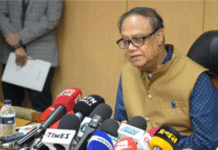TBS

The National Board of Revenue (NBR) has pushed back against key suggestions from the International Monetary Fund (IMF), firmly stating that it will not impose new taxes or withdraw existing exemptions before their scheduled expiry.
During a series of meetings held in Dhaka with the visiting IMF delegation recently, the NBR made it clear that Bangladesh would not implement any mid-year tax hikes or abrupt policy changes, citing current economic realities.
According to NBR officials, tax exemptions will continue until their scheduled expiry under the government’s existing sunset policy. They also argued that applying a uniform 15% VAT rate on all goods and services is not feasible at present as it could fuel inflation and hurt essential sectors.
NBR Chairman Abdur Rahman Khan told TBS, “The IMF team asked us to raise taxes. But we already have a policy framework for taxation, and we will not raise taxes beyond that policy just to meet their demand.”
He noted that while the government had already raised VAT and supplementary duties on about 100 goods and services last January – following IMF recommendations to boost revenue – it cannot continue doing so repeatedly. “Just because we raised taxes once doesn’t mean we can keep doing it repeatedly. If that becomes the norm, it would be difficult to maintain fiscal discipline,” he said.
An NBR official who attended the IMF meeting on 30 October told this newspaper that structural reforms would continue as part of the IMF programme, but no new taxes would be introduced midway through the fiscal year.
He explained that most goods and services in Bangladesh are already subject to the standard 15% VAT rate, while essential items – such as basic food, remittance-related services, poultry and fisheries, and certain healthcare services – are taxed at lower rates or exempted. “Imposing a flat 15% rate on these would further increase inflationary pressures,” he added.
The official also said the IMF was informed that the government plans to gradually move towards a standard VAT rate, rather than doing so abruptly.
When approving the $4.7 billion loan package, the IMF set around 30 reform conditions for Bangladesh, covering areas such as tax collection, the banking sector, subsidy rationalisation, and financial governance. While the country has made progress in some sectors, its revenue growth remains below IMF expectations, leading to the lender’s dissatisfaction.
In the fiscal 2023-24, Bangladesh’s tax-to-GDP ratio stood at 7.4%, with the IMF expecting it to rise to about 8% in FY25. However, instead of improving, the ratio declined to 6.6%, prompting fresh scrutiny of the NBR’s performance and tax reform progress.









